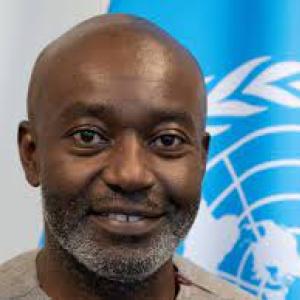Good morning Excellencies, Ladies and Gentlemen.
Allow me to start by acknowledging...
• The Honourable Minister of Forestry, Fisheries and Environment in South Africa – Ms. Barbara Creecy,
• His Excellency, the Under Secretary of State and National BIOFIN Focal Point, Ministry of Environment in Cambodia – Mr. Chan Somaly,
• The Under Secretary-general of the United Nations and Executive
Director of the UN Environment Programme (UNEP) – Ms. Inger
Andersen,
• The Deputy Subsecretary of Sustainable Production and Policies,
Executive Office of the President of Brazil – Ms. Karen Cope,
• The CEO of the Green Climate Fund, Mr Carlos Manuel Rodriguez,
• The UNDP Global Head for Ecosystems and Biodiversity, Ms. Midori
Paxton,
• The Resident Representative, UNDP in South Africa, Dr. Ayodele
Odusola, as well as my other colleagues from the UN family in South Africa.
It is my honour to deliver a welcome and message of goodwill on behalf of the United Nations in South Africa during this very important conference that brings together key partners across sectors, senior government officials, members of the diplomatic community, the United Nations family and distinguished experts and guests.
Congratulations to the United Nations Development Programme (UNDP) and collaborative partners for this visionary Biodiversity Finance Initiative (BIOFIN) - A United Nations flagship programme to finance the Conservation and Sustainable Use of our Biodiversity and transform millions of lives.
At the opening of the United Nations’ key Biodiversity Conference, COP15 in Montreal in December last year the United Nations Secretary-General sounded the alarm in his opening remarks that “without nature, we are nothing”.
The Secretary-General warned that there is no PLANET B, and that multinational Corporations are ‘emptying our world of its natural gifts.’
At the same Conference, the United Nations Deputy Secretary-General and Chair of its Sustainable Development Group emphasized that developed countries must support developing nations, financially and technically, as developing countries including South Africa are a home to a great majority of the world’s biodiversity and they are bearing a disproportionate cost for the gradual loss of this global good.
Actions are needed from all sides – governments to design national action plans and private sector to step up and share the responsibility of the biodiversity protection. Most importantly, inclusion of local communities, women, youth, and academia to the decision-making processes is critical.
A recent study by the Nature Conservancy shows we need 824 billion US dollars annually to restore and protect the plants and ecosystems that sustain us.
Reality is a vastly different story. We are only investing USD 121 billion per year.
That staggering gap must be urgently addressed.
We must accelerate our efforts to preserve and protect the ecosystems essential to our existence.
It is a daunting task ahead of us.
Armed with scientific know-how and political will we meet this moment with commitment for action.
This Conference starting today sows the seeds to actualise ‘living in harmony with Nature,’ – AND I ALSO WOULD SAY ENSURING ‘THRIVING PEOPLE AND NATURE,’ to underscore the unavoidable connection between People and Planet, which, when managed sustainably, translates to Shared Prosperity.
Again, it is paramount that no-one is left behind and, to this end, the UN duly notes that the biodiversity sector remains substantially untransformed and there is inequality in the access to benefits arising from biodiversity and associated ecosystem services.
This means that issues of exclusion of indigenous people and local communities from equitably accessing and “justly” benefitting from Natural Resources must be meaningfully addressed.
The attainment of the outcomes of the 5th Global Conference on Biodiversity Finance will contribute strongly to the achievement of a broad range of the Sustainable Development Goals, as well as the goals encapsulated in the African Union’s Agenda 2063, and key relevant Multilateral Environmental Agreements (MEAs) that South Africa has signed and ratified.
I must also not forget to mention the complementarity with South Africa’s National Development Plan and also the White Paper on Conservation and Sustainable Use of South Africa’s Biodiversity, which all provide a solid basis for initiating concrete actions.
Excellencies, Ladies, and Gentlemen,
We can no longer afford to be complacent.
It is past time for bold and innovative solutions to finance biodiversity in developing countries, increase investments in nature-based solutions, mainstream biodiversity across all sectors of development planning, and mobilize adequate financial and technical resources to conserve our natural heritage.
The UN Family in South Africa is proud to support this 5th Global Conference on Biodiversity Finance focusing on New Opportunities to Finance Conservation.
I am happy to note that the Conference is in alignment with the Cooperation Framework being implemented by the UN in South Africa, and particularly with the Strategic Priority area on: Climate Resilience and Sustainable Management of Natural Resources.
Our efforts aim at ensuring that people in South Africa live prosperous and healthy lives in a safe and cohesive society that protects and values environmental sustainability. To achieve this, we are focusing on working with the Government and other national stakeholders on the just energy transition and a low-carbon society, and on sustainable utilization of natural resources with specifically looking at the resilience and well-being of marginalized and vulnerable communities.
Your excellencies, ladies, and gentlemen,
Let us therefore redouble our efforts and work together with renewed urgency and passion to preserve the beauty and wonder of our natural world.
In fact, we have no choice, but to deliver our individual and collective moral and ethical duty to protect our planet, now and for future generations.
I wish you productive deliberations and one more reassure you that the UN in South Africa stands ready to support and work together to take forward and leverage the outcomes of this Conference.
I thank you.









